Six Sigma: Quality Management, DMAIC, TQM, and Business Analysis
VerifiedAdded on 2022/08/12
|5
|1147
|16
Report
AI Summary
This report examines Six Sigma methodology, focusing on its application within a business context. It explores the DMAIC (Define, Measure, Analyze, Improve, Control) process as a key framework for quality improvement, emphasizing its role in identifying and resolving business problems. The report also delves into Total Quality Management (TQM), highlighting its principles of workplace ethics and integrity, as well as the importance of trust, fairness, and responsibility in achieving strategic goals. Furthermore, it discusses potential failures in quality management initiatives, such as resistance to change, a lack of genuine quality culture, and the use of improper models. The report concludes by referencing relevant academic sources to support its findings.
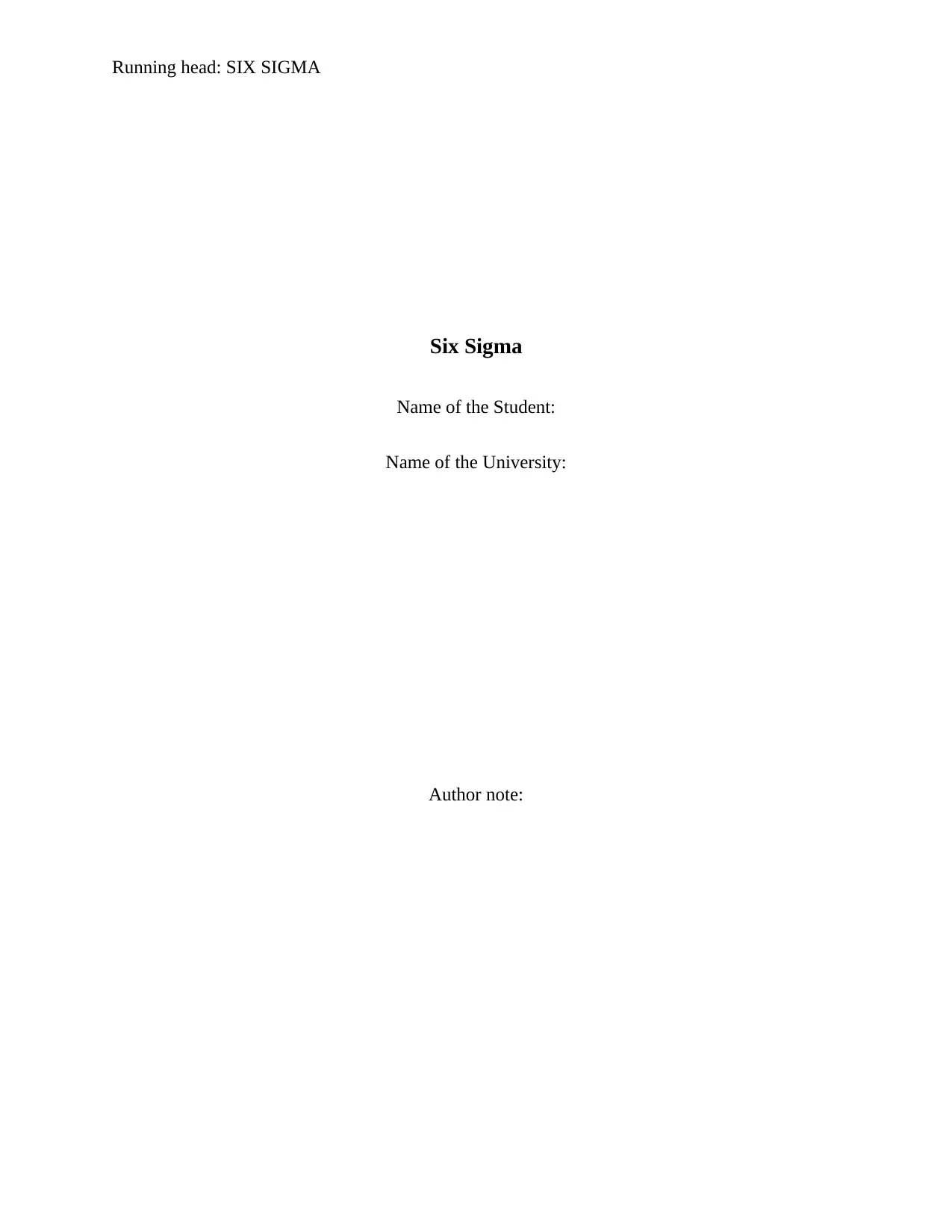
Running head: SIX SIGMA
Six Sigma
Name of the Student:
Name of the University:
Author note:
Six Sigma
Name of the Student:
Name of the University:
Author note:
Paraphrase This Document
Need a fresh take? Get an instant paraphrase of this document with our AI Paraphraser
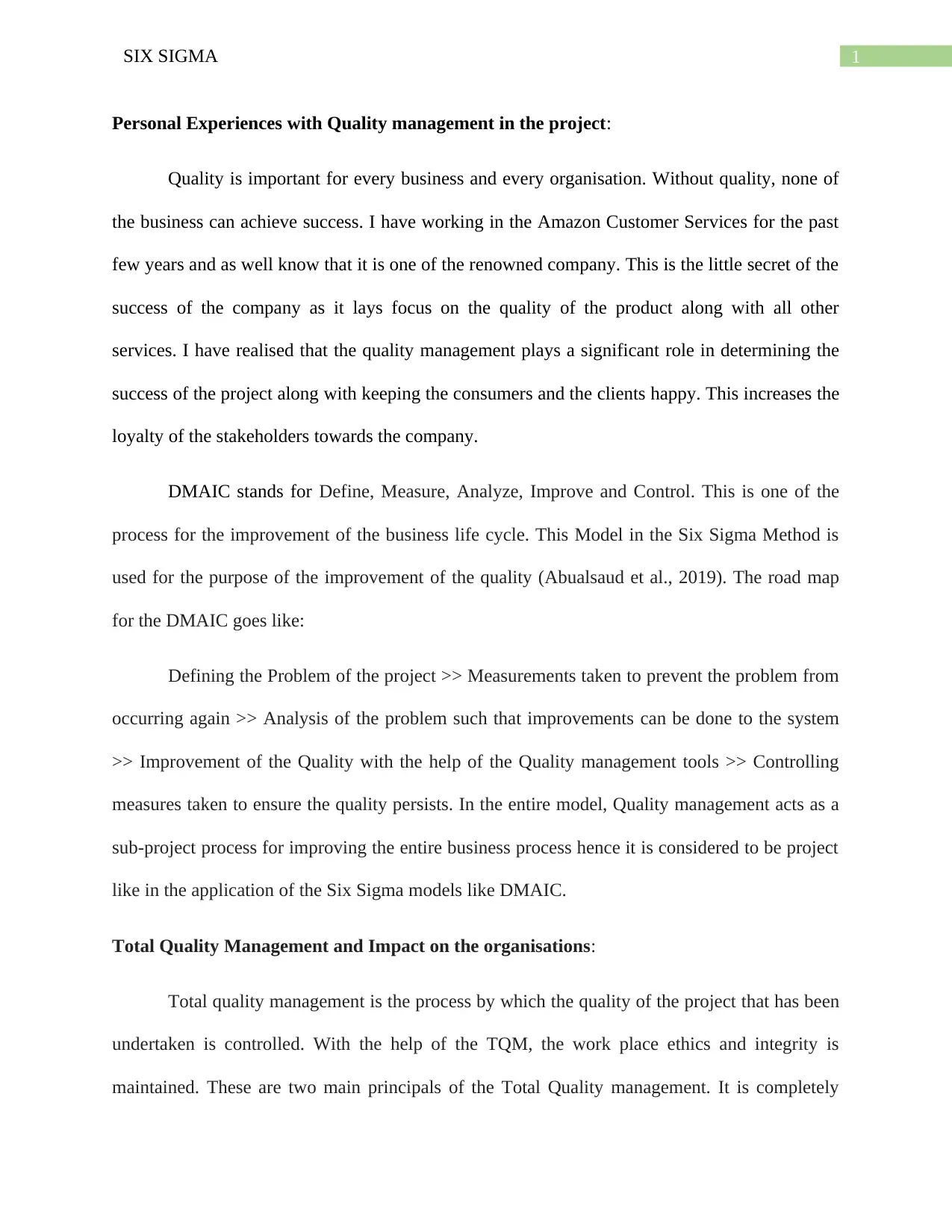
1SIX SIGMA
Personal Experiences with Quality management in the project:
Quality is important for every business and every organisation. Without quality, none of
the business can achieve success. I have working in the Amazon Customer Services for the past
few years and as well know that it is one of the renowned company. This is the little secret of the
success of the company as it lays focus on the quality of the product along with all other
services. I have realised that the quality management plays a significant role in determining the
success of the project along with keeping the consumers and the clients happy. This increases the
loyalty of the stakeholders towards the company.
DMAIC stands for Define, Measure, Analyze, Improve and Control. This is one of the
process for the improvement of the business life cycle. This Model in the Six Sigma Method is
used for the purpose of the improvement of the quality (Abualsaud et al., 2019). The road map
for the DMAIC goes like:
Defining the Problem of the project >> Measurements taken to prevent the problem from
occurring again >> Analysis of the problem such that improvements can be done to the system
>> Improvement of the Quality with the help of the Quality management tools >> Controlling
measures taken to ensure the quality persists. In the entire model, Quality management acts as a
sub-project process for improving the entire business process hence it is considered to be project
like in the application of the Six Sigma models like DMAIC.
Total Quality Management and Impact on the organisations:
Total quality management is the process by which the quality of the project that has been
undertaken is controlled. With the help of the TQM, the work place ethics and integrity is
maintained. These are two main principals of the Total Quality management. It is completely
Personal Experiences with Quality management in the project:
Quality is important for every business and every organisation. Without quality, none of
the business can achieve success. I have working in the Amazon Customer Services for the past
few years and as well know that it is one of the renowned company. This is the little secret of the
success of the company as it lays focus on the quality of the product along with all other
services. I have realised that the quality management plays a significant role in determining the
success of the project along with keeping the consumers and the clients happy. This increases the
loyalty of the stakeholders towards the company.
DMAIC stands for Define, Measure, Analyze, Improve and Control. This is one of the
process for the improvement of the business life cycle. This Model in the Six Sigma Method is
used for the purpose of the improvement of the quality (Abualsaud et al., 2019). The road map
for the DMAIC goes like:
Defining the Problem of the project >> Measurements taken to prevent the problem from
occurring again >> Analysis of the problem such that improvements can be done to the system
>> Improvement of the Quality with the help of the Quality management tools >> Controlling
measures taken to ensure the quality persists. In the entire model, Quality management acts as a
sub-project process for improving the entire business process hence it is considered to be project
like in the application of the Six Sigma models like DMAIC.
Total Quality Management and Impact on the organisations:
Total quality management is the process by which the quality of the project that has been
undertaken is controlled. With the help of the TQM, the work place ethics and integrity is
maintained. These are two main principals of the Total Quality management. It is completely
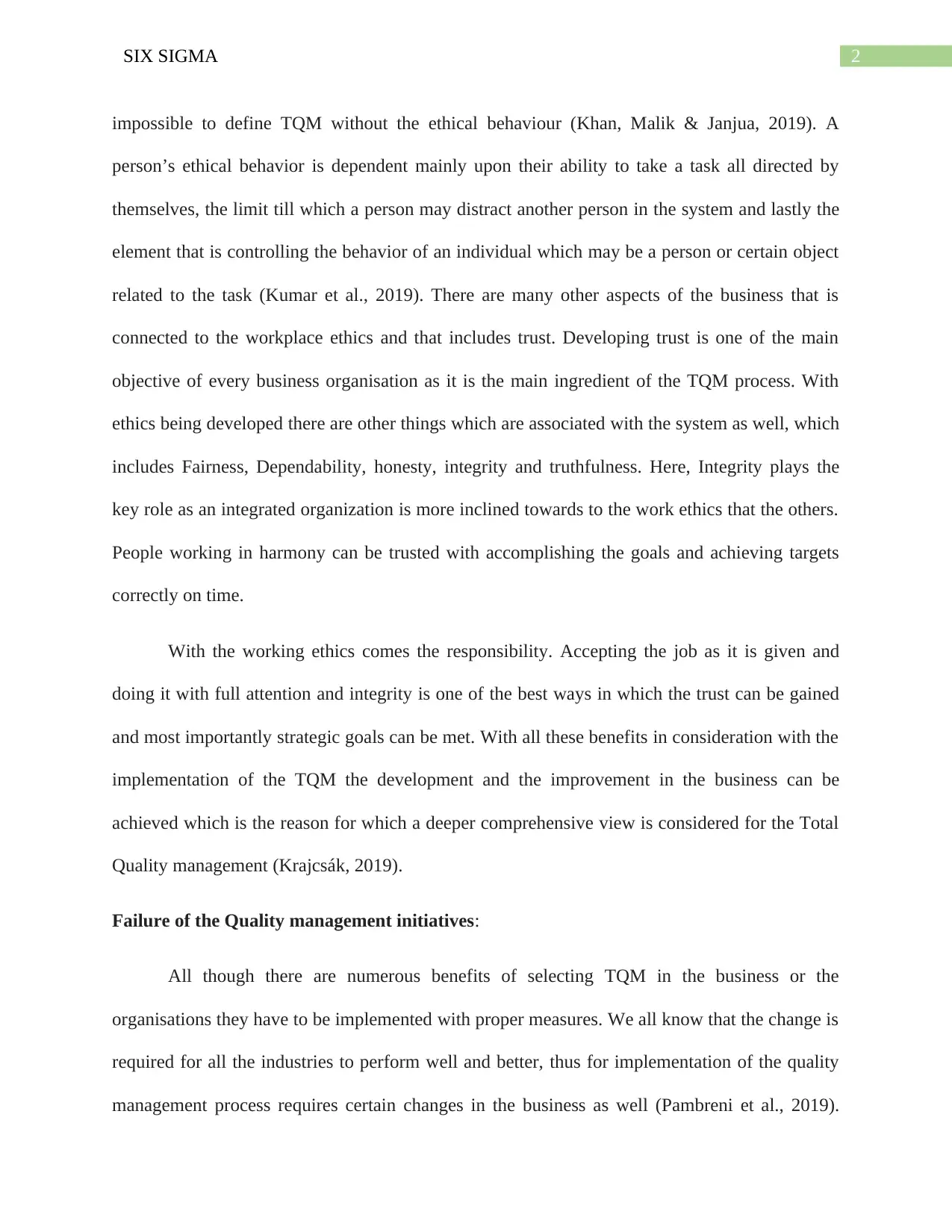
2SIX SIGMA
impossible to define TQM without the ethical behaviour (Khan, Malik & Janjua, 2019). A
person’s ethical behavior is dependent mainly upon their ability to take a task all directed by
themselves, the limit till which a person may distract another person in the system and lastly the
element that is controlling the behavior of an individual which may be a person or certain object
related to the task (Kumar et al., 2019). There are many other aspects of the business that is
connected to the workplace ethics and that includes trust. Developing trust is one of the main
objective of every business organisation as it is the main ingredient of the TQM process. With
ethics being developed there are other things which are associated with the system as well, which
includes Fairness, Dependability, honesty, integrity and truthfulness. Here, Integrity plays the
key role as an integrated organization is more inclined towards to the work ethics that the others.
People working in harmony can be trusted with accomplishing the goals and achieving targets
correctly on time.
With the working ethics comes the responsibility. Accepting the job as it is given and
doing it with full attention and integrity is one of the best ways in which the trust can be gained
and most importantly strategic goals can be met. With all these benefits in consideration with the
implementation of the TQM the development and the improvement in the business can be
achieved which is the reason for which a deeper comprehensive view is considered for the Total
Quality management (Krajcsák, 2019).
Failure of the Quality management initiatives:
All though there are numerous benefits of selecting TQM in the business or the
organisations they have to be implemented with proper measures. We all know that the change is
required for all the industries to perform well and better, thus for implementation of the quality
management process requires certain changes in the business as well (Pambreni et al., 2019).
impossible to define TQM without the ethical behaviour (Khan, Malik & Janjua, 2019). A
person’s ethical behavior is dependent mainly upon their ability to take a task all directed by
themselves, the limit till which a person may distract another person in the system and lastly the
element that is controlling the behavior of an individual which may be a person or certain object
related to the task (Kumar et al., 2019). There are many other aspects of the business that is
connected to the workplace ethics and that includes trust. Developing trust is one of the main
objective of every business organisation as it is the main ingredient of the TQM process. With
ethics being developed there are other things which are associated with the system as well, which
includes Fairness, Dependability, honesty, integrity and truthfulness. Here, Integrity plays the
key role as an integrated organization is more inclined towards to the work ethics that the others.
People working in harmony can be trusted with accomplishing the goals and achieving targets
correctly on time.
With the working ethics comes the responsibility. Accepting the job as it is given and
doing it with full attention and integrity is one of the best ways in which the trust can be gained
and most importantly strategic goals can be met. With all these benefits in consideration with the
implementation of the TQM the development and the improvement in the business can be
achieved which is the reason for which a deeper comprehensive view is considered for the Total
Quality management (Krajcsák, 2019).
Failure of the Quality management initiatives:
All though there are numerous benefits of selecting TQM in the business or the
organisations they have to be implemented with proper measures. We all know that the change is
required for all the industries to perform well and better, thus for implementation of the quality
management process requires certain changes in the business as well (Pambreni et al., 2019).
⊘ This is a preview!⊘
Do you want full access?
Subscribe today to unlock all pages.

Trusted by 1+ million students worldwide
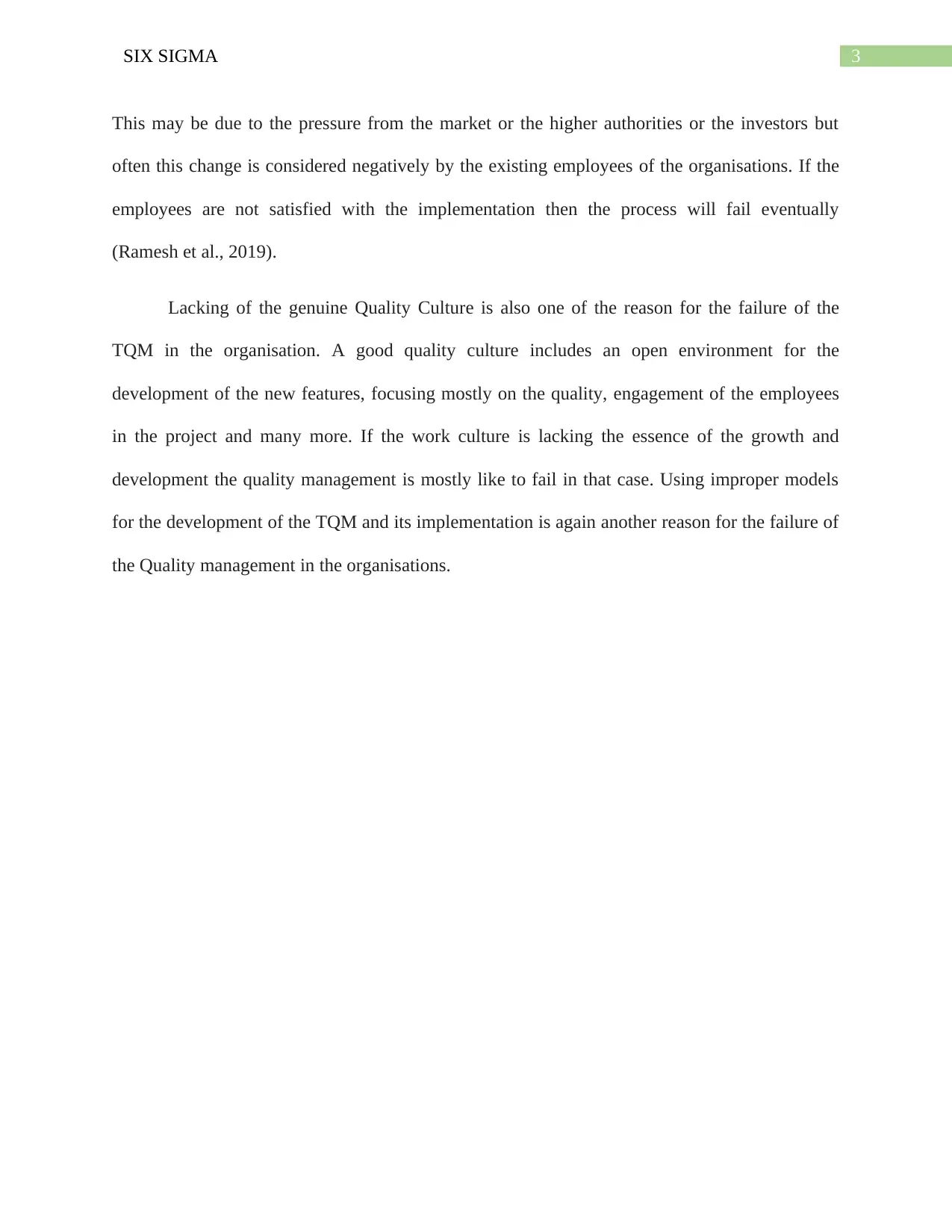
3SIX SIGMA
This may be due to the pressure from the market or the higher authorities or the investors but
often this change is considered negatively by the existing employees of the organisations. If the
employees are not satisfied with the implementation then the process will fail eventually
(Ramesh et al., 2019).
Lacking of the genuine Quality Culture is also one of the reason for the failure of the
TQM in the organisation. A good quality culture includes an open environment for the
development of the new features, focusing mostly on the quality, engagement of the employees
in the project and many more. If the work culture is lacking the essence of the growth and
development the quality management is mostly like to fail in that case. Using improper models
for the development of the TQM and its implementation is again another reason for the failure of
the Quality management in the organisations.
This may be due to the pressure from the market or the higher authorities or the investors but
often this change is considered negatively by the existing employees of the organisations. If the
employees are not satisfied with the implementation then the process will fail eventually
(Ramesh et al., 2019).
Lacking of the genuine Quality Culture is also one of the reason for the failure of the
TQM in the organisation. A good quality culture includes an open environment for the
development of the new features, focusing mostly on the quality, engagement of the employees
in the project and many more. If the work culture is lacking the essence of the growth and
development the quality management is mostly like to fail in that case. Using improper models
for the development of the TQM and its implementation is again another reason for the failure of
the Quality management in the organisations.
Paraphrase This Document
Need a fresh take? Get an instant paraphrase of this document with our AI Paraphraser
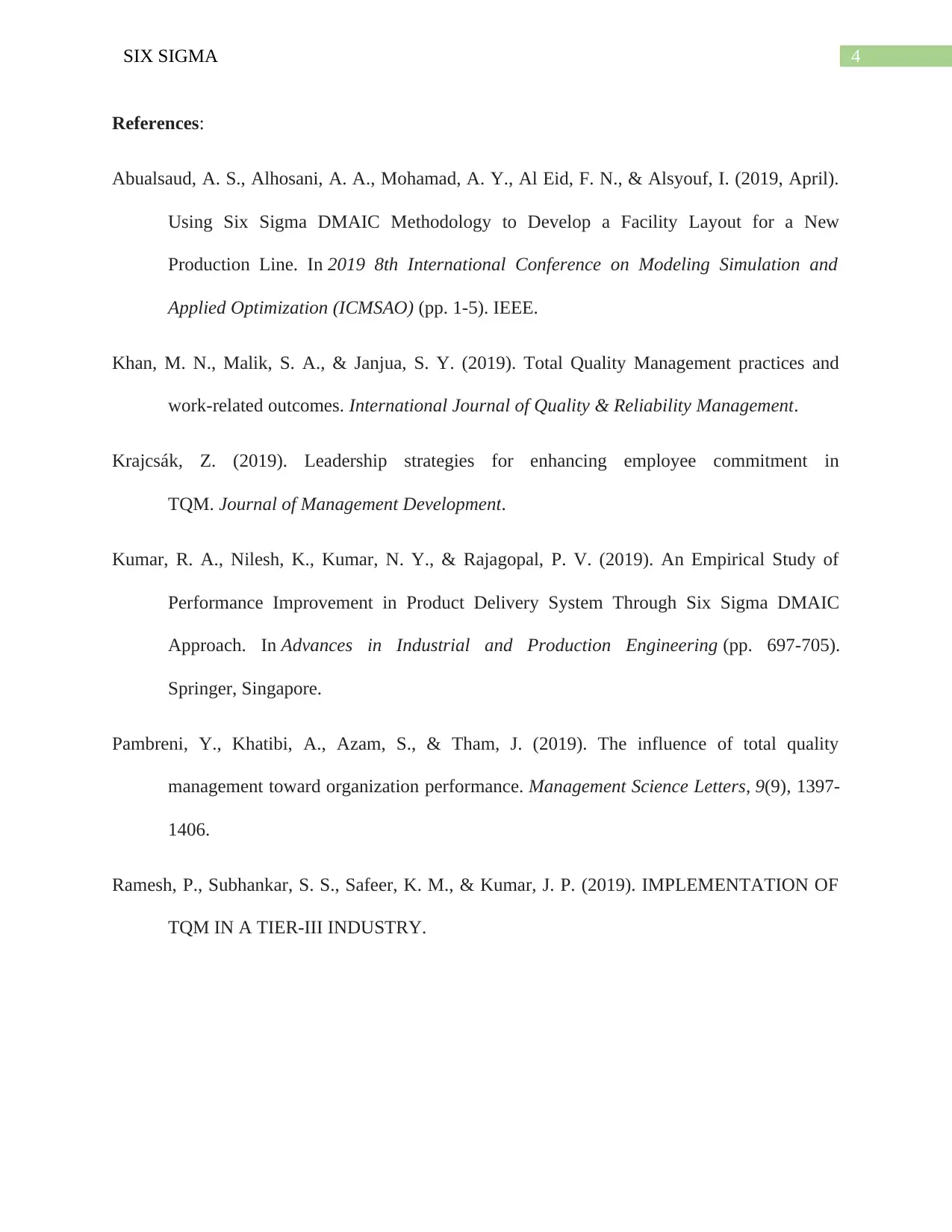
4SIX SIGMA
References:
Abualsaud, A. S., Alhosani, A. A., Mohamad, A. Y., Al Eid, F. N., & Alsyouf, I. (2019, April).
Using Six Sigma DMAIC Methodology to Develop a Facility Layout for a New
Production Line. In 2019 8th International Conference on Modeling Simulation and
Applied Optimization (ICMSAO) (pp. 1-5). IEEE.
Khan, M. N., Malik, S. A., & Janjua, S. Y. (2019). Total Quality Management practices and
work-related outcomes. International Journal of Quality & Reliability Management.
Krajcsák, Z. (2019). Leadership strategies for enhancing employee commitment in
TQM. Journal of Management Development.
Kumar, R. A., Nilesh, K., Kumar, N. Y., & Rajagopal, P. V. (2019). An Empirical Study of
Performance Improvement in Product Delivery System Through Six Sigma DMAIC
Approach. In Advances in Industrial and Production Engineering (pp. 697-705).
Springer, Singapore.
Pambreni, Y., Khatibi, A., Azam, S., & Tham, J. (2019). The influence of total quality
management toward organization performance. Management Science Letters, 9(9), 1397-
1406.
Ramesh, P., Subhankar, S. S., Safeer, K. M., & Kumar, J. P. (2019). IMPLEMENTATION OF
TQM IN A TIER-III INDUSTRY.
References:
Abualsaud, A. S., Alhosani, A. A., Mohamad, A. Y., Al Eid, F. N., & Alsyouf, I. (2019, April).
Using Six Sigma DMAIC Methodology to Develop a Facility Layout for a New
Production Line. In 2019 8th International Conference on Modeling Simulation and
Applied Optimization (ICMSAO) (pp. 1-5). IEEE.
Khan, M. N., Malik, S. A., & Janjua, S. Y. (2019). Total Quality Management practices and
work-related outcomes. International Journal of Quality & Reliability Management.
Krajcsák, Z. (2019). Leadership strategies for enhancing employee commitment in
TQM. Journal of Management Development.
Kumar, R. A., Nilesh, K., Kumar, N. Y., & Rajagopal, P. V. (2019). An Empirical Study of
Performance Improvement in Product Delivery System Through Six Sigma DMAIC
Approach. In Advances in Industrial and Production Engineering (pp. 697-705).
Springer, Singapore.
Pambreni, Y., Khatibi, A., Azam, S., & Tham, J. (2019). The influence of total quality
management toward organization performance. Management Science Letters, 9(9), 1397-
1406.
Ramesh, P., Subhankar, S. S., Safeer, K. M., & Kumar, J. P. (2019). IMPLEMENTATION OF
TQM IN A TIER-III INDUSTRY.
1 out of 5
Related Documents
Your All-in-One AI-Powered Toolkit for Academic Success.
+13062052269
info@desklib.com
Available 24*7 on WhatsApp / Email
![[object Object]](/_next/static/media/star-bottom.7253800d.svg)
Unlock your academic potential
Copyright © 2020–2026 A2Z Services. All Rights Reserved. Developed and managed by ZUCOL.





